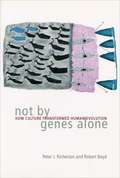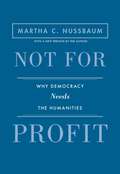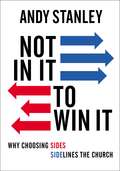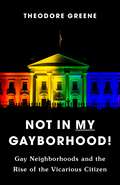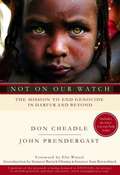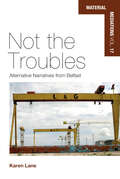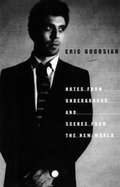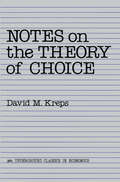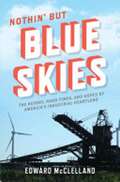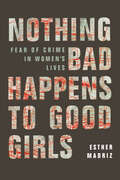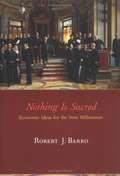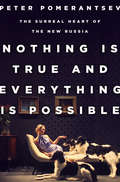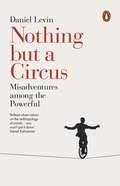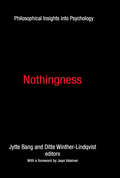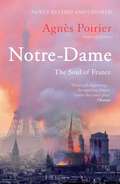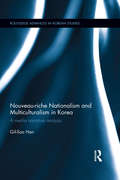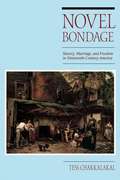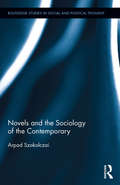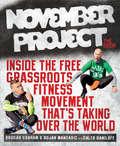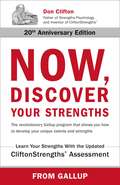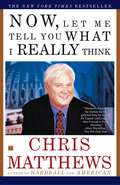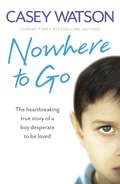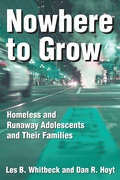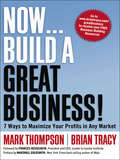- Table View
- List View
Not by Genes Alone: How Culture Transformed Human Evolution
by Peter J. Richerson Robert BoydA groundbreaking theory of the role of culture in evolution, this book offers a radical interpretation of human evolution, arguing that our ecological dominance and our singular social systems stem from a psychology uniquely adapted to create complex culture.
Not for Profit: Why Democracy Needs the Humanities (Princeton Classics)
by Martha C. NussbaumA passionate defense of the humanities from one of today's foremost public intellectualsIn this short and powerful book, celebrated philosopher Martha C. Nussbaum makes a passionate case for the importance of the liberal arts at all levels of education.Historically, the humanities have been central to education because they have been seen as essential for creating competent democratic citizens. But recently, Nussbaum argues, thinking about the aims of education has gone disturbingly awry in the United States and abroad. We increasingly treat education as though its primary goal were to teach students to be economically productive rather than to think critically and become knowledgeable, productive, and empathetic individuals. This shortsighted focus on profitable skills has eroded our ability to criticize authority, reduced our sympathy with the marginalized and different, and damaged our competence to deal with complex global problems. And the loss of these basic capacities jeopardizes the health of democracies and the hope of a decent world.In response to this dire situation, Nussbaum argues that we must resist efforts to reduce education to a tool of the gross national product. Rather, we must work to reconnect education to the humanities in order to give students the capacity to be true democratic citizens of their countries and the world.Translated into twenty-five languages, Not for Profit draws on the stories of troubling—and hopeful—global educational developments. Nussbaum offers a manifesto that should be a rallying cry for anyone who cares about the deepest purposes of education.
Not for Profit: Why Democracy Needs the Humanities - Updated Edition (The Public Square #21)
by Martha C. NussbaumA passionate defense of the humanities from one of today's foremost public intellectualsIn this short and powerful book, celebrated philosopher Martha Nussbaum makes a passionate case for the importance of the liberal arts at all levels of education.Historically, the humanities have been central to education because they have been seen as essential for creating competent democratic citizens. But recently, Nussbaum argues, thinking about the aims of education has gone disturbingly awry in the United States and abroad. We increasingly treat education as though its primary goal were to teach students to be economically productive rather than to think critically and become knowledgeable, productive, and empathetic individuals. This shortsighted focus on profitable skills has eroded our ability to criticize authority, reduced our sympathy with the marginalized and different, and damaged our competence to deal with complex global problems. And the loss of these basic capacities jeopardizes the health of democracies and the hope of a decent world.In response to this dire situation, Nussbaum argues that we must resist efforts to reduce education to a tool of the gross national product. Rather, we must work to reconnect education to the humanities in order to give students the capacity to be true democratic citizens of their countries and the world.In a new preface, Nussbaum explores the current state of humanistic education globally and shows why the crisis of the humanities has far from abated. Translated into over twenty languages, Not for Profit draws on the stories of troubling—and hopeful—global educational developments. Nussbaum offers a manifesto that should be a rallying cry for anyone who cares about the deepest purposes of education.
Not in It to Win It: Why Choosing Sides Sidelines The Church
by Andy StanleyIs it possible to disagree politically and love unconditionally? The reaction of evangelicals to political and cultural shifts in recent years revealed what they value most. Lurking beneath our Bible-laced rhetoric, faith claims, books, and sermons is a relentless drive to WIN!But the church is not here to win. By every human measure, our Savior lost. On purpose. With a purpose. And we are his body. We are not in it to win anything. We are in it for something else entirely. That something else is what this book is about.You'll discover:How to take a stand the right way. You'll learn how to make your case with a posture of humility and understanding, rather than being fueled by the fear of losing something.How to view politics through the lens of faith. Learn curiously, listen intentionally, and love unconditionally.How the life of Jesus and his teaching applies to modern-day challenges in a fresh way. The "biblical" stand may not be what we've been taught.Jesus never asked his followers to agree on everything. But he did call his followers to obey a new command: to love others in the same way he has loved us. Instead of asserting our rights or fighting for power, we need to begin asking ourselves: what does love require of me?
Not in My Gayborhood: Gay Neighborhoods and the Rise of the Vicarious Citizen
by Theodore GreeneGay neighborhoods are disappearing—or so the conventional story goes. In this narrative, political gains and mainstream social acceptance, combined with the popularity of dating apps like Grindr, have reduced the need for LGBTQ+ people to seek refuges or build expressly queer places. Yet even though residential patterns have shifted, traditionally gay neighborhoods remain centers of queer public life.Exploring “gayborhoods” in Washington, DC, Theodore Greene investigates how neighborhoods retain their cultural identities even as their inhabitants change. He argues that the success and survival of gay neighborhoods have always depended on participation from nonresidents in the life of the community, which he terms “vicarious citizenship.” Vicarious citizens are diverse self-identified community members, sometimes former or displaced locals, who make symbolic claims to the neighborhood. They defend their vision of community by temporarily reviving the traditions and cultures associated with the gay neighborhood and challenging the presence of straight families and other newcomers, the displacement of local institutions, or the taming of sexual culture. Greene pays careful attention to the significance of race and racism, highlighting the important role of Black LGBTQ+ culture in shaping gay neighborhoods past and present. Examining the diverse placemaking strategies that queer people deploy to foster and preserve LGBTQ+ geographies, Not in My Gayborhood illuminates different ways of imagining urban neighborhoods and communities.
Not on Our Watch: The Mission to End Genocide in Darfur and Beyond
by Don Cheadle John PrendergastIf you care about issues of genocide and other mass atrocities, but you don't know what to do to make a difference, this book was written for you.
Not the Troubles: Alternative Narratives from Belfast (Material Mediations: People and Things in a World of Movement)
by Karen LaneBelfast is often analysed as a divided society, anchored in ethno-politico-religious differences amid a long history of conflict. However, shifting the focus of academic attention reveals a range of alternative narratives of city life. Using storytelling as a leitmotif, this ethnographic account explores the epistemological validity of engaging with strangers in a range of settings, such as street corners, a hairdresser’s and a storytelling evening. It considers how creative writers represent life in Belfast. The author employs a variety of methods, including a dog as a research assistant and storytelling on location which demonstrates how people can re-shape and re-narrate life in Belfast.
Notes From Underground
by Eric BogosianIncludes Bogosian's Notes from Underground, the "diary," of an increasingly disturbed and disturbing urban recluse, together with Scenes from the New World, an early dramatic work.
Notes On The Theory Of Choice
by David KrepsIn this book, Professor Kreps presents a first course on the basic models of choice theory that underlie much of economic theory. This course, taught for several years at the Graduate School of Business, Stanford University, gives the student an introduction to the axiomatic method of economic analysis, without placing too heavy a demand on mathematical sophistication.The course begins with the basics of choice and revealed preference theory and then discusses numerical representations of ordinal preference. Models with uncertainty come next: First is von Neumann?Morgenstern utility, and then choice under uncertainty with subjective uncertainty, using the formulation of Anscombe and Aumann, and then sketching the development of Savage's classic theory. Finally, the course delves into a number of special topics, including de Finetti's theorem, modeling choice on a part of a larger problem, dynamic choice, and the empirical evidence against the classic models.
Nothin' but Blue Skies: The Heyday, Hard Times, and Hopes of America's Industrial Heartland
by Edward McClellandThe Upper Midwest and Great Lakes region became the "arsenal of democracy"-the greatest manufacturing center in the world-in the years during and after World War II, thanks to natural advantages and a welcoming culture. Decades of unprecedented prosperity followed, memorably punctuated by riots, strikes, burning rivers, and oil embargoes. A vibrant, quintessentially American character bloomed in the region's cities, suburbs, and backwaters. <p><p> But the innovation and industry that defined the Rust Belt also helped to hasten its demise. An air conditioner invented in Upstate New York transformed the South from a sweaty backwoods to a non-unionized industrial competitor. Japan and Germany recovered from their defeat to build fuel-efficient cars in the stagnant 1970s. The tentpole factories that paid workers so well also filled the air with soot, and poisoned waters and soil. The jobs drifted elsewhere, and many of the people soon followed suit. <p><p> Nothin' but Blue Skies tells the story of how the country's industrial heartland grew, boomed, bottomed, and hopes to be reborn. Through a propulsive blend of storytelling and reportage, celebrated writer Edward McClelland delivers the rise, fall, and revival of the Rust Belt and its people.
Nothing Bad Happens to Good Girls: Fear of Crime in Women's Lives
by Esther Madriz"The possibility of being a victim of a crime is ever present on my mind; thinking about it as natural as breathing."—40-year-old womanThis is a compelling analysis of how women in the United States perceive the threat of crime in their everyday lives and how that perception controls their behavior. Esther Madriz draws on focus groups and in-depth interviews to show the damage that fear can wreak on women of different ages and socioeconomic backgrounds. Although anxiety about crime affects virtually every woman, Madriz shows that race and class position play a role in a woman's sense of vulnerability.Fear of crime has resulted in public demand for stronger and more repressive policies throughout the country. As funds for social programs are cut, Madriz points out, those for more prisons and police are on the increase. She also illustrates how media images of victims—"good" victims aren't culpable, "bad" victims invite trouble—and a tough political stance toward criminals are linked to a general climate of economic uncertainty and conservatism.Madriz argues that fear itself is a strong element in keeping women in subservient and self-limiting social positions. "Policing" themselves, they construct a restricted world that leads to positions of even greater subordination: Being a woman means being vulnerable. Considering the enormous attention given to crime today, including victims' rights and use of public funds, Madriz's informative study is especially timely.
Nothing Is Sacred: Economic Ideas for the New Millenium
by Robert J. BarroSince the 1970s, Robert Barro's academic research has significantly influenced macroeconomic theory. For more than a decade, his writing has also enlivened the pages of publications such as the Wall Street Journal and Business Week. In Nothing Is Sacred, Barro applies his well-honed free market arguments to a remarkably diverse range of issues. These include global problems such as growth and debt, as well as social issues such as the predictive value of SAT scores, drug legalization, the economics of beauty, and the relationship between abortion rights and crime reduction. The book opens with a series of essays on famous economists, past and present, and other prominent figures whose work has economic implications, including Joe DiMaggio and Bono. In the book's second part, Barro discusses the economics of social issues. In the third part, he considers democracy, growth, and international policy, and in the final part he examines fiscal policy, monetary policy, and the macroeconomy. Throughout, he shows that even the most widely held beliefs are not sacred truths but are open to analysis.
Nothing Is True and Everything Is Possible: The Surreal Heart of the New Russia
by Peter PomerantsevIn the new Russia, even dictatorship is a reality show. <P><P>Professional killers with the souls of artists, would-be theater directors turned Kremlin puppet-masters, suicidal supermodels, Hell’s Angels who hallucinate themselves as holy warriors, and oligarch revolutionaries: welcome to the glittering, surreal heart of twenty-first-century Russia. It is a world erupting with new money and new power, changing so fast it breaks all sense of reality, home to a form of dictatorship-far subtler than twentieth-century strains-that is rapidly rising to challenge the West. <P><P>When British producer Peter Pomerantsev plunges into the booming Russian TV industry, he gains access to every nook and corrupt cranny of the country. He is brought to smoky rooms for meetings with propaganda gurus running the nerve-center of the Russian media machine, and visits Siberian mafia-towns and the salons of the international super-rich in London and the US. <P><P>As the Putin regime becomes more aggressive, Pomerantsev finds himself drawn further into the system. Dazzling yet piercingly insightful, Nothing Is True and Everything Is Possible is an unforgettable voyage into a country spinning from decadence into madness.
Nothing but a Circus: Misadventures among the Powerful
by Daniel Levin'Brilliant observations on the anthropology of power. You will laugh aloud and you won't put it down' Daniel KahnemanIn this eye-opening exploration of the human weaknesses for power, Daniel Levin takes us on a hilarious journey through the absurd world of our global elites, drawing unforgettable sketches of some of the puppets who stand guard, and the jugglers and conjurers employed within. Most spectacular of all, however, are the astonishing contortions performed by those closest to the top in order to maintain the illusion of integrity, decency, and public service. Based on the author's first hand experiences of dealing with governments and political institutions around the world, Nothing but a Circus offers a rare glimpse of the conversations that happen behind closed doors, observing the appalling lengths that people go to in order to justify their unscrupulous choices, from Dubai to Luanda, Moscow to Beijing, and at the heart of the UN and the US government.
Nothingness: Philosophical Insights into Psychology (History And Theory Of Psychology Ser.)
by Jytte BangThis book addresses nothingness as not only the intangible presence of an emotional, cultural, social, or even political void that is felt on an existential level, but has some solid foundations in reality. The death of a loved one, the social isolation of an individual, or the culture shock one may experience in another country are examples of situations in which an external sense of absence mirrors an internal psychological and philosophical sense of nothingness.Not much has been explicitly written on nothingness in the history of psychology. On the other hand, nothingness seems to be implicitly embedded in many scholars' work. This duality of explicitly and implicitly expressed ideas about nothingness reveals how psychology finds inspiration in philosophy, and vice versa. The book aims to illustrate how the concept of the presence of absence�nothingness�fills a void in contemporary psychological theorizing.
Notre-Dame: The Soul of France
by Agnès PoirierWINNER OF THE 2022 FRENCH HERITAGE SOCIETY BOOK AWARD The profound emotion felt around the world upon seeing images of Notre-Dame in flames opens up a series of questions: Why was everyone so deeply moved? Why does Notre-Dame so clearly crystallise what our civilisation is about? What makes &‘Our Lady of Paris&’ the soul of a nation and a symbol of human achievement? What is it that speaks so directly to us today? In answer, Agnès Poirier turns to the defining moments in Notre-Dame&’s history. Beginning with the laying of the corner stone in 1163, she recounts the conversion of Henri IV to Catholicism, the coronation of Napoleon, Victor Hugo&’s nineteenth-century campaign to preserve the cathedral, Baron Haussmann&’s clearing of the streets in front of it, the Liberation in 1944, the 1950s film of The Hunchback of Notre-Dame, starring Gina Lollobrigida and Anthony Quinn, and the state funeral of Charles de Gaulle, before returning to the present. The conflict over Notre-Dame&’s reconstruction promises to be fierce. Nothing short of a cultural war is already brewing between the wise and the daring, the sincere and the opportunist, historians and militants, the devout and secularists. It is here that Poirier reveals the deep malaise – gilet jaunes and all – at the heart of the France.
Nouveau-riche Nationalism and Multiculturalism in Korea: A media narrative analysis (Routledge Advances in Korean Studies)
by Gil-Soo HanThe unprecedented economic success of South Korea since the 1990s has led in turn to a large increase in the number of immigrants and foreign workers in Korean industries. This book describes and explains the experiences of discrimination and racism that foreigners and ‘new’ Koreans have faced in a multicultural South Korea. It looks at how society has treated the foreigners and what their experiences have been given that common discourse about race in Korea surrounds issues of Korean heterogeneity and pure blood nationalism. Starting with critiques of Korean scholarship and policy framework on multiculturalism, this book argues for the need to revisit the most fundamental aspect of multiculturalism: the host population’s ability to respect new comers rather than discriminate against them. The author employs a critical realist understanding of racism and attempts to identify long-lasting institutional factors which make Korean society less than welcoming ‘new’ or temporary Koreans. A large number of new reportages are identified and systematically analysed based on the principles of grounded theory method. The findings show that nouveau-riche nationalism and pure-blood nationalism are widely practised when Koreans deal with ‘foreigners’. As a newly industrialised and highly successful nation, Korean society is still in transition and treats foreigners according to economic standard of their countries of origin. As one of the very first books in English about foreigners’ experiences of Korean nationalism, multiculturalism and discrimination, it will be of great interest to students and scholars of Sociology, Ethnic studies, Asian studies, Korean studies, Media studies and Cultural studies.
Novel Bondage: Slavery, Marriage, and Freedom in Nineteenth-Century America
by Tess ChakkalakalNovel Bondage unravels the interconnections between marriage, slavery, and freedom through renewed readings of canonical nineteenth-century novels and short stories by black and white authors. Situating close readings of fiction alongside archival material concerning the actual marriages of authors such as Lydia Maria Child, Harriet Beecher Stowe, William Wells Brown, and Frank J. Webb, Chakkalakal examines how these early novels established literary conventions for describing the domestic lives of American slaves in describing their aspirations for personal and civic freedom. Exploring this theme in post-Civil War works by Frances E.W. Harper and Charles Chesnutt, she further reveals how the slave-marriage plot served as a fictional model for reforming marriage laws. Chakkalakal invites readers to rethink the "marital work" of nineteenth-century fiction and the historical role it played in shaping our understanding of the literary and political meaning of marriage, then and now.
Novels and the Sociology of the Contemporary (Routledge Studies in Social and Political Thought #110)
by Arpad SzakolczaiThis book substantiates two claims. First, the modern world was not simply produced by "objective" factors, rooted in geographical discoveries and scientific inventions, to be traced to economic, technological or political factors, but is the outcome of social, cultural and spiritual processes. Among such factors, beyond the Protestant ethic (Max Weber), the rise of the absolutist state and its disciplinary network (Michel Foucault), or court society (Norbert Elias), a prime role is played by theatre. The modern reality is deeply theatricalized. Second, a special access for studying this theatricalized world is offered by novels. The best classical novels not simply can be interpreted as describing a world "like" the theatre, but they capture and present a world that has become thoroughly transformed into a global theatre. The theatre effectively transformed the world, and classical novels effectively analyze this "theatricalized" reality – much better than the main instruments supposedly destined to study reality, philosophy and sociology. Thus, instead of using the technique of sociology to analyze novels, the book will treat novels as a "royal road" to analyze a theatricalized reality, in order to find our way back to a genuine and meaningful life.
November Project: Inside the Free, Grassroots Fitness Movement That's Taking Over the World
by Caleb Daniloff Brogan Graham Bojan MandaricNovember Project: The Book is the story of how two irreverent, way-outside-the-box fitness fanatics are flipping the fitness industry on its head and literally making the world a better place, one city at a time. No facility. No machines. Just two dudes and a tribe of thousands. Welcome to November Project’s world takeover.What started 4 years ago as a simple monthlong workout pact between two former Northeastern University oarsmen in Boston has grown into an international fitness phenomenon. November Project espouses free, public, all-weather, outdoor group sweats that turn strangers into friends and connect everyone to the city in which they live. It’s been described as everything from flashmob fitness to “the fight club of running clubs” and a cult. But November Project prides itself on defying categories.In November Project: The Book, Brogan Graham (a.k.a. BG) and Bojan Mandaric, in their own spicy, big-hearted words, chronicle, along with tribe member and writer Caleb Daniloff, their fitness movement’s genesis, evolution, operations, membership, “secret sauce,” and future—and along the way, show you how you can get fit and societally engaged. The book also includes illustrated workouts; the keys to meaningful civic engagement; information on using your city as a gym; advice on starting an NP tribe; tips on growing, sustaining, and invigorating membership through social media; and thoughts on the collective power of community.
Now, Discover Your Strengths
by GallupThe 20th anniversary edition of Now, Discover Your Strengths comes with an access code to the Clifton StrengthsFinder 2.0 assessment. This updated assessment includes reports and resources that go far beyond the standardized reports of the older assessment by providing you with personalized insight statements unique to your specific combination of strengths.The original publication of Now, Discover Your Strengths in 2001 launched a worldwide strengths revolution. To date, more than 20 million people have discovered their strengths, and tens of thousands more are discovering theirs every week. Gallup Press has published numerous strengths-based books, and Gallup Strengths Center has become a worldwide destination for strengths-based development. Since the book&’s release, Gallup has continued to dedicate countless hours to developing our strengths science, the brainchild of the late Dr. Donald O. Clifton, who was named Father of Strengths-Based Psychology by the American Psychological Association. Part of that investment resulted in Clifton StrengthsFinder 2.0 — a refined upgrade of the original assessment for discovering your strengths. To ensure that you have the best possible experience in discovering and developing your strengths, we have made Clifton StrengthsFinder 2.0 available to those who purchase the 20th anniversary edition of Now, Discover Your Strengths. The updated assessment includes new reports and resources, including the Strengths Insight and Action-Planning Guide. This guide goes far beyond the standardized reports of the older assessment by providing you with personalized insight statements unique to your specific combination of strengths. These highly customized Strengths Insights are an in-depth analysis of your top five strengths. They describe who you are in astonishing detail and provide you with a comprehensive understanding of yourself, your strengths and what makes you stand out. These updated resources, in combination with the 20th anniversary edition of Now, Discover Your Strengths, give you the best opportunity to soar with your strengths — at work and in your life.
Now, Let Me Tell You What I Really Think
by Christopher MatthewsMatthews tells us about his "God and Country" Catholic school education in Philadelphia, complete with Cold War air-raid drills, and his early enthusiasm for politics. He shares with us his life's adventures.
Nowhere to Go
by Casey WatsonFoster carer Casey Watson shares the shocking true story of Tyler, an abused eleven-year-old who, after stabbing his step-mother, had nowhere else to go.
Nowhere to Grow: Homeless and Runaway Adolescents and Their Families (Social Institutions And Social Change Ser.)
by Les B. WhitbeckLes B. Whitbeck and Dan R. Hoyt begin their report on street children in the Midwest with the statement, "If you live in or have visited even a medium-sized city recently, you have seen runaway and homeless young people. They congregate in certain downtown areas and hang out in malls during inclement weather . . . Mostly, they look like the other kids. . . . The difference is that they won't be going home tonight."This book draws on a study of over six hundred runaway and homeless adolescents and over two hundred of their caretakers from cities in four Midwestern states. It focuses on the family histories of these young people and on the developmental impact of early independence. Street social networks, subsistence strategies, sexuality, and street victimization are all considered, as well as their effect on adolescent behaviors and emotional health.Relying on interviews and data from survey research, and working in partnership with street outreach agencies, Whitbeck and Hoyt lead the reader through the various risk factors associated with precocious independence, beginning in the family and extending to external environments and behaviors. Nowhere to Grow is an emotional account of the cumulative consequences for young people with few good options at the outset and even fewer once they are on their own.
Now . . . Build a Great Business!: 7 Ways to Maximize Your Profits in Any Market
by Brian Tracy Mark "Sauce ThompsonDon&’t be daunted by a challenging economy and fierce competition. Even in the toughest environment, innovative, highly profitable businesses abound and yours can be one of them.Bestselling business authority Mark Thompson and international success expert Brian Tracy join forces to show you how great leadership, great people, and great products are the key to building a phenomenally successful business.In Now, Build a Great Business!, you&’ll learn how to:inspire superior results from everyone around you;attract and keep great people;develop a business plan that maximizes your resources;identify market demands;deliver superior customer service;craft a standout marketing plan;and motivate customers to buy again and again.Thompson and Tracy reveal a series of seven principles guaranteed to improve any business in any industry. This guide also features real-world examples from wildly successful businesses and accessible, all-encompassing strategies to guide you through the most important facets of any profitable venture--including leadership, sales, and marketing.Now, Build a Great Business! will transform your business and help you deliver extraordinary results.
